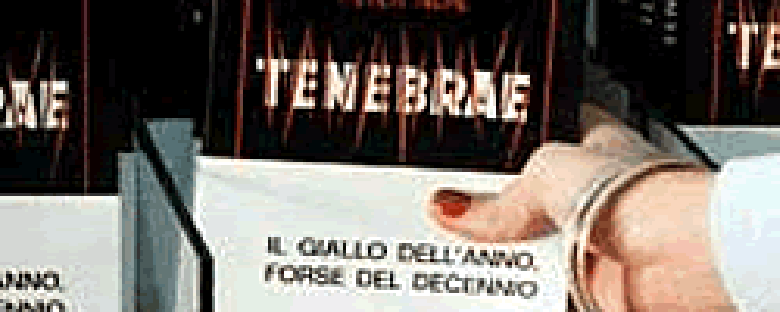Reviews
Tenebrae
Dario Argento
Italy, 1982
Credits
Review by Rumsey Taylor
Posted on 11 July 2004
Source Anchor Bay Entertainment DVD
Author Peter Neal is in Rome promoting the release of his latest horror novella “Tenebrae.” Soon after his arrival, a woman is found murdered — pages of his book have been stuffed in her mouth. Neal is approached by an investigator, who stubbornly (and realistically) refuses to see a coincidence in the act and Neal’s presence in Rome. Neal is slightly annoyed, supplies his alibi, and counters: “If someone is killed with a Smith and Wesson revolver, do you go and interview the president of Smith and Wesson?”
Neal is not a direct suspect for the crime (and the ones that follow), though he is in a crucial position in the investigation; his books and his knowledge, as the author, may reveal the integral clue in solving the mystery.
Tenebre finds Dario Argento in trademark form. The murders — all violently gruesome — are staged, photographed, and edited with obsessive construction. And we will see a victim’s head thrust backwards through a shattering window — it is a signature expiration seen in both Deep Red and Suspiria.
Preceding the matter of the second victim, there is a phenomenal long shot that lingers and tracks the face of an apartment building, over it, and to the side, displaying the next two victims. This is perhaps the most yielding example of the director’s intent: establishing atmosphere. Little happens in the shot’s duration in way of forwarding the narrative, yet the slowly-tracking image (effectively mirrored in Goblin’s synth-score) functions as anticipatory dread: the women seen will soon be killed, the murderer is present, and we observe their oblivious ignorance (both are informed of the previous murder) for their impending deaths.
As stated, Argento’s work is frequently lauded for its technique, though here, unexpectedly, there is a noticeable emphasis on narrative. It hinges, of course, upon the identity of the proverbial “killer,” and Tenebre offers enough unexpected diversions in its course that its end isolates only the most illogical suspects.
Tenebre is nearer to body of Argento’s filmography, and seems like an homage to his early gialli; in comparison it marks the extent of the director’s progressive evolution. Tenebre is among Argento’s best films.
We don’t do comments anymore, but you may contact us here or find us on Twitter or Facebook.



